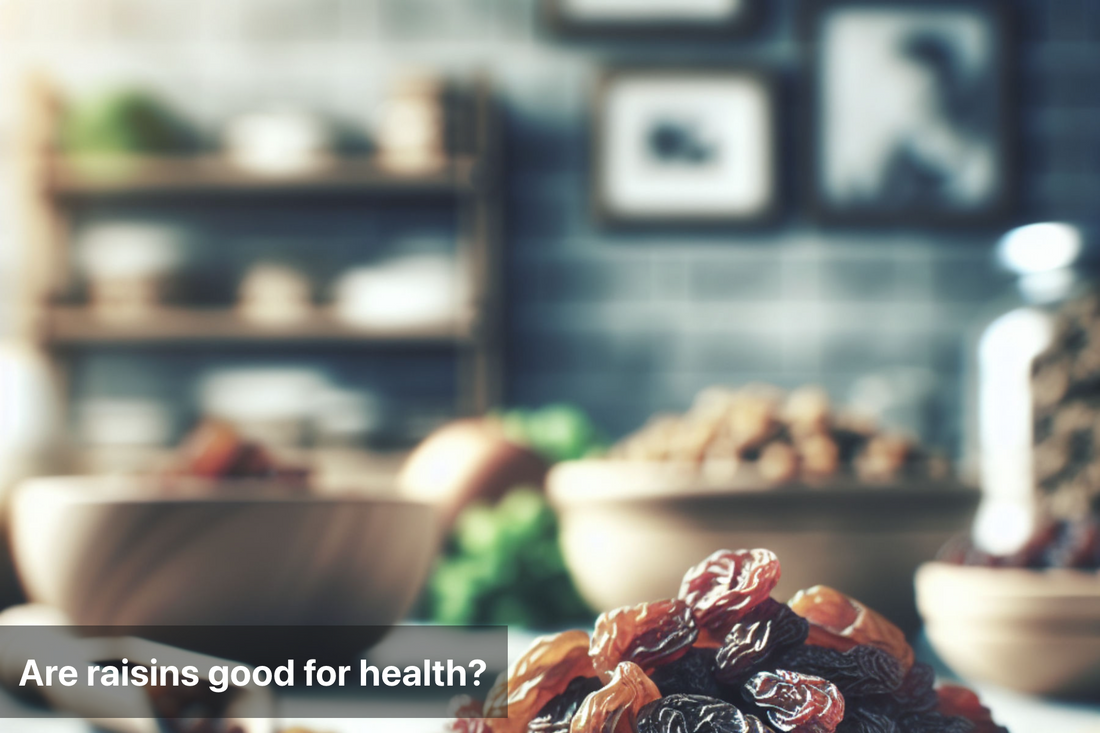
Are raisins good for health?
Share
Raisins, or dried grapes, are often dismissed as sugary snack foods—but these naturally sweet morsels pack more nutrition than they get credit for. Rich in fiber, vitamins, minerals, and antioxidants, raisins can be a health-boosting addition to your diet when eaten in the right way and quantity.
Nutritional Snapshot: What’s Inside a Raisin?
Calories: ~299 kcal per 100g
Natural sugars: ~59g per 100g (mainly fructose and glucose)
Dietary fiber: ~3.7g per 100g
Key micronutrients: Iron, potassium, magnesium, copper, and B vitamins
Antioxidants: Polyphenols and flavonoids that support heart and cellular health
Though calorie-dense due to water loss during drying, raisins retain the nutrients found in grapes—concentrated in a smaller serving.
Health Benefits of Eating Raisins
1. Improves Digestive Health
Raisins are rich in insoluble fiber that adds bulk to stool and aids regular bowel movements. They act as a mild natural laxative when soaked and consumed in the morning.
2. Supports Heart Health
The potassium content in raisins helps regulate blood pressure by countering sodium. They also contain phytonutrients that may reduce LDL cholesterol oxidation and inflammation in blood vessels.
3. Boosts Iron Levels
Raisins are a decent plant-based source of iron, making them helpful for individuals with mild iron-deficiency anemia or low hemoglobin. Pairing them with vitamin C-rich foods enhances iron absorption.
4. Promotes Bone Density
With trace amounts of calcium and magnesium, raisins contribute to stronger bones. They also contain boron, a mineral that supports calcium retention and bone metabolism.
5. Supports Oral Health
Despite being sticky, raisins contain phytochemicals like oleanolic acid that may help suppress oral bacteria associated with cavities and gum disease—when eaten in moderation.
Types of Raisins and Their Unique Qualities
Type of Raisin |
Color |
Notable Traits |
Best Uses |
|---|---|---|---|
Black Raisins |
Dark brown |
High in iron and antioxidants |
Oatmeal, smoothies, snacking |
Golden Raisins |
Light yellow |
Slightly sweeter, treated with sulfur |
Baking, cereals, salads |
Green Raisins |
Pale green |
Chewy, tart flavor |
Indian sweets, chutneys |
Red Raisins |
Deep red |
More robust in flavor |
Trail mixes, energy bars |
Munakka (Big Raisins) |
Plump, brown |
Used in Ayurveda for respiratory health |
Soaked overnight, medicinal |
When to Eat Raisins for Maximum Benefits
Soaked overnight: Softens the fiber, reduces natural acidity, and improves digestion
Before a workout: Natural sugars provide quick energy without artificial additives
With meals: Enhances iron absorption and adds texture to dishes
On an empty stomach: Soaked raisins with warm water can relieve constipation
Raisins vs. Grapes: Which is Healthier?
Nutrient |
Grapes (100g) |
Raisins (100g) |
What to Note |
|---|---|---|---|
Calories |
~70 kcal |
~299 kcal |
Raisins are calorie-dense |
Sugar |
~15g |
~59g |
Sugar concentration increases on drying |
Fiber |
~0.9g |
~3.7g |
Raisins have more digestive fiber |
Iron |
~0.4mg |
~1.9mg |
Raisins are a better iron source |
Water content |
High (~81%) |
Low |
Raisins are more concentrated in nutrients |
Both have their place in a healthy diet—grapes for hydration and snacking, raisins for nutrient density in small portions.
Smart Tips for Adding Raisins to Your Diet
Top your oatmeal or muesli with a tablespoon of raisins for natural sweetness
Mix into trail mixes with nuts and seeds for a fiber-rich energy boost
Add to curries, pulao, or biryani for contrast and flavor balance
Blend into smoothies with banana and spinach for iron-rich blends
Include in baking for muffins, energy bites, and granola bars
Common Myths About Raisins—Debunked
Myth 1: Raisins are bad for blood sugar.
Reality: While high in natural sugar, their fiber content slows sugar absorption. Eaten in moderation, they can be safe even for people with insulin resistance.
Myth 2: Raisins cause cavities.
Reality: Raisins do stick to teeth, but they also contain compounds that combat oral bacteria. Good dental hygiene prevents issues.
Myth 3: Only soaked raisins are healthy.
Reality: Soaking reduces tannins and improves digestion, but dry raisins are equally nutritious if portion-controlled.
Possible Precautions and Side Effects
Overeating risk: Raisins are calorie-dense. Stick to 1–2 tablespoons per day to avoid excess sugar and calories.
Sulfite sensitivity: Golden raisins may contain sulfur dioxide as a preservative—choose unsulphured or organic if sensitive.
Dental hygiene: Brush after consuming sticky foods like raisins to prevent plaque buildup.
Allergies: Though rare, some may be allergic to grapes or dried fruit preservatives.
Summary
Raisins are a concentrated source of energy, iron, fiber, and antioxidants that support digestion, heart health, and immunity. When eaten in moderation, they can be a tasty and healthful addition to both sweet and savory meals. Whether dry or soaked, adding a handful of raisins daily can elevate your nutrient intake naturally.






